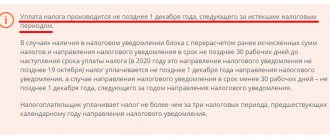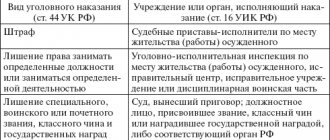general information
What is punishment in criminal law?
This is a certain type of punishment or coercion to suffer actions in order to achieve a specific goal of re-education , and not for the purpose of the fact of infliction itself.
Punishment provides for the deprivation of a person who has broken the law of a certain type of benefit . Punishment is aimed at any suffering of the criminal for the unlawful actions that were committed by him. But any type of punishment for the criminal is assigned depending on certain factors , for example, the severity of the crime, the presence of mitigating circumstances, etc.
Any punishment carries a certain shade of retribution , but in no case is it; punishment is regulated directly by law .
The essence of any punishment lies in punishment , that is, it is a measure of response of a criminal nature and is recognized in actions that are directly provided for by law, such as imprisonment for a specified period or restriction of any right.
The essence of criminal punishment
Two concepts such as crime and punishment have a very close connection.
Punishment can be considered as a response on behalf of the state to an act of a criminal nature that was committed by a certain person.
As for the essence of criminal punishment , it lies in the punishability of the crime, thus the criminal law itself is a kind of way of manipulating human behavior.
Criminal punishment is, in its essence, a coercive punishment . That is, on the part of law enforcement agencies, the application of punishment , and the criminal must unquestioningly obey it, thereby depriving him of freedom and certain types of rights .
The very essence of criminal punishment carries a certain punitive process , which will differ for different types of punishment provided, and will take into account all factors related to a particular case.
To assign a certain punishment to a criminal, it is necessary to consider certain factors that relate to the convicted person :
- The gravity of his crime;
- Personal properties of the criminal.
That is, the convicted person can be punished in the following ways :
- Complete isolation from society through imprisonment;
- A criminal may be limited only in certain labor rights;
- The offender may be deprived of certain material benefits, such as a monthly salary;
- And in the most severe cases, law enforcement agencies have the right to take the life of a criminal.
The punishment and its measures directly depend on the trial ; the court has the final say regarding not only the punishment itself, but also its terms.
Minors
Juvenile offenders do not have any privileges, they are not subject to special punishment, they are held accountable as a general rule .
The legislation does not consider special mitigation of punishment for minors. The only thing that can mitigate the punishment for such criminals is a reduction in penalties .
Minors who violate the law will not be sentenced to death or life imprisonment .
Also, they will not include types of punishment provided for another category of citizens who have a different status from them, for example, minors cannot be deprived of the right to hold a position , etc.
For juvenile offenders there are such types of punishments as:
- A monetary fine for the crime;
- Deprivation of the right to engage in certain activities, if the status of a criminal allows it;
- Encumbrance for compulsory work;
- Encumbrance for correctional work;
- Arrest;
- Imprisonment for a period established by the court.
If an adult criminal has received a fine, then it cannot exceed 50 thousand rubles , or must be equal to the income of the minor, if any, for a certain time, usually the period does not exceed 6 months.
If the offender does not have any income, then the fine is attributed to his parents or legal representatives .
As for the deprivation of the right to engage in any activity, most often this rule does not apply to persons under the age of majority, but if the law provides for compulsory work as a punishment, then it can last from 40 to 160 hours, depending on the severity of the crime . These works include activities that minor citizens can handle.
Corrective labor may be assigned for a longer period, which can last from 60 days to 1 year . With such punishments, all work complies with the standards regarding the labor rights of minors.
If a similar category of criminals is arrested, then the age of the child is taken into account; persons over 16 years of age can be arrested . And the period of arrest is not very long, it ranges from 1 to 4 months .
If a minor offender is deprived of his liberty, then the term of his imprisonment can be a term that will not exceed 10 years , but if the offender has not reached 16 years , then the maximum term is reduced to 6 years . But this punishment will follow a crime of a particularly serious nature.
Legislation does not have the right to replace one punishment with another for a juvenile offender if he evades responsibility.
When a court makes a decision on punishment for a minor, it takes into account many factors , including the following:
- In what conditions does a juvenile offender live?
- What is his development on the mental level, what are his personal characteristics;
- How much influence does his older relatives have on the criminal?
When assigning and executing a sentence to a minor, a complex sequence of actions is used :
- First of all, the resulting sentence must be reduced to the maximum amount imposed on the minor;
- The next step is to reduce the result in the event of an assassination attempt;
- Then, through the rules on mitigation of punishment in case of repentance, the punishment is subject to another reduction;
- Then the provision is taken into account, which states that the lower limit of punishment is subject to reduction by exactly half;
- The last step is to apply the general rules of punishment.
Commentary to Art. 43 of the Criminal Code of the Russian Federation
Punishment is not just a negative sanction of a criminal law norm, but the most important legal institution of a complex (intersectoral) nature. The institution of punishment is related to criminal, criminal procedural and criminal executive law. The functions of punishment are very diverse, and therefore, in theory, criminal punishment is considered in different aspects - as a legal institution, as a form of implementation of criminal liability, as a crime prevention factor, etc.
In Part 1 of Art. 43 of the Criminal Code of the Russian Federation, punishment is defined as a measure of state coercion, imposed by a court verdict. Punishment is applied to a person found guilty of committing a crime and consists of deprivation or restriction of the rights and freedoms of this person as provided for in the Criminal Code of the Russian Federation.
Since the definition reflects the properties of the phenomenon being defined, it is possible to understand from it the main features of criminal punishment.
1. Punishment is a measure of state coercion. First of all, punishment is coercion; its administration and execution are carried out against the will of the convicted person. Punishment is always imposed on behalf of the state, the Russian Federation, i.e. is of a public nature and expresses official condemnation of the criminal and his actions. The appointment and execution of criminal punishment is the exclusive prerogative of authorized state bodies. All participants in legal relations are obliged to obey the decisions on punishment that have entered into legal force. The compulsory nature of the punishment also means the obligation of the convicted person to endure the deprivations and restrictions associated with serving the assigned sentence.
From other coercive measures applied, for example, for administrative offenses, criminal punishment differs quantitatively (includes more restrictions) and qualitatively (it is assigned only for committing crimes, and its appointment entails a legal consequence in the form of a criminal record).
2. Criminal punishment is a special measure of state coercion, imposed only by the court. In accordance with Part 1 of Art. 49 of the Constitution of the Russian Federation, no one can be found guilty of committing a crime until his guilt is proven in the manner prescribed by law and established by a court verdict that has entered into legal force. According to Part 1 of Art. 118 of the Constitution of the Russian Federation, justice in the Russian Federation is carried out only by the court. The court is the only government body that makes a conviction and imposes criminal punishment. Exemption from punishment is also carried out only by the court. An extrajudicial procedure for release from punishment is possible only by virtue of acts of amnesty or pardon.
3. Punishment is personal (individual) in nature. In accordance with the principle of guilt (Article 5 of the Criminal Code of the Russian Federation), liability arises only for a guilty act. Punishment can only be applied to the person found guilty of the crime and to no one else. Modern criminal law does not know collective responsibility and punishment.
This is also true for cases of involvement in a crime - the acquisition or sale of property known to be obtained by criminal means that was not promised in advance (Article 175 of the Criminal Code of the Russian Federation), and the concealment of especially serious crimes that was not promised in advance (Article 316 of the Criminal Code of the Russian Federation). These acts are not causally related to the crime committed and are not a type of complicity, i.e. do not form complicity, and responsibility for them arises because they themselves contain signs of an independent crime. Their social danger lies in the fact that they complicate the activities of law enforcement agencies in finding, exposing and punishing persons guilty of committing a crime. For example, if Ivanov hides his friend Petrov, who committed a murder, in the basement, then he is responsible not for the murder committed by Petrov, but for his (precisely his!) actions in hiding the criminal.
But the personal nature of punishment does not mean that it cannot cause suffering (harm) and not affect persons not involved in the crime, for example, family members of the convicted person.
4. Punishment consists of deprivation or restriction of the rights and freedoms of the guilty person. The content of the punishment is to deprive the subject of any material or spiritual benefits provided for by the criminal law or limit them, which causes him suffering. This could be freedom, property, honor, etc. Different types of punishment differ precisely in their content. As a result of conviction, the criminal may lose many other benefits (family, respect of others, etc.), but they are not included in the content of the punishment, since the need for their deprivation is not specified in the law. The famous Russian lawyer N.S. drew attention to this. Tagantsev: “It is necessary to separate from punishment the moral torment and remorse experienced by the criminal, even if they were so strong that in order to stop them he hastened to surrender to the hands of justice and suffer his guilt. It is further necessary to highlight the changes caused by the crime in the attitude towards the perpetrator of his family, acquaintances, society, the loss of love, respect, trust, and, moreover, even when such a loss is expressed in an external, tangible form: a father’s curse will not be a punishment in the legal sense, although it was accompanied by the drawing up of a spiritual will by an angry father, depriving the guilty son of his inheritance; it will not be a punishment to give up a home, not to give a hand, to lose an election, etc., as long as all these deprivations do not constitute a legal limitation of the individual and his rights.”
———————————
Tagantsev N.S. Russian criminal law: Lectures. The general part. T. 2. M., 1994. P. 6.
Also not included in the content of punishment, for example, imprisonment, means of correction (socially useful work, training, educational work, etc.). After all, work, education, and sports are good in themselves.
The content of punishment appears in the legal form of legal restrictions - deprivation or restriction of the rights and freedoms of man and citizen. These restrictions can only be established by federal law. In Part 3 of Art. 55 of the Constitution of the Russian Federation exhaustively defines the grounds for establishing such restrictions: protecting the foundations of the constitutional system, morality, health, rights and legitimate interests of other persons, ensuring the defense of the country and the security of the state.
Sometimes a criminal record is also considered a sign of punishment. If a criminal record is a sign of punishment, then when there is no punishment, there should be no criminal record. But those who have been convicted are also persons to whom no punishment was applied (conditionally sentenced during the probationary period), and persons who are released from serving their sentence (early or after serving their sentence). In addition, a criminal record characterizes not the punishment as such, but the person to whom it is assigned. Therefore, it would be more correct to recognize a criminal record not as a sign of punishment, but as a legal consequence of its appointment, expressed in the special legal status of the person.
The goals of punishment are among the system-forming characteristics; they influence the construction and direction of many legal institutions (for example, imposition of punishment, exemption from serving a sentence) and the nature of the sanctions of criminal law norms. So, in Part 1 of Art. 60 of the Criminal Code of the Russian Federation prescribes: “A more severe type of punishment from among those provided for committing crimes is assigned only if a less severe type of punishment cannot ensure the achievement of the goals of punishment.” The goals of punishment are determined by the criminal policy of the state: by formulating goals, the legislator shows what desired end result the state seeks to achieve by applying criminal punishment for crimes committed. The question of goals is closely related to the problem of the effectiveness of criminal punishment, and criminal law in general.
From the principle of humanism (Part 2 of Article 7 of the Criminal Code of the Russian Federation) it follows that punishment is not intended to cause physical or moral suffering. The state does not take revenge on criminals, punishment does not aim simply to punish the criminal, the effect of punishment is directed to the future. C. Beccaria wrote: “The purpose of punishment is not to torture and torment a person and not to make an already committed crime non-existent... The purpose of punishment is only to prevent the guilty person from again causing harm to society and to deter others from committing the same.”
———————————
Beccaria C. On crimes and punishments. M., 1939. P. 373.
Punishment is not the purpose of punishment, but its essence, i.e. inherent (attributive) property. What does not have the property of punishment, what is not capable of causing suffering, cannot be punishment. In this case, we are not talking about the individual perception of punishment (different people can experience deprivation of the same benefit differently), but about the generally accepted idea of it. As N.S. wrote Tagantsev, “deprivation or limitation of benefits and rights is suffering from the point of view of the general conditions of human life, the known average sensation of suffering, regardless of how the person being punished looks at it and feels it.” And only because punishment objectively has the property of causing suffering can the goal of preventing crimes be set before it. And since punishment in itself is punishment, there is no point in setting the goal of punishment before it.
———————————
Tagantsev N.S. Russian criminal law: Lectures. The general part. T. 2. M., 1994. P. 92.
In Part 2 of Art. 43 of the Criminal Code of the Russian Federation legislates the purposes of punishment: “Punishment is applied to restore social justice, as well as to correct the convicted person and prevent the commission of new crimes.” Thus, punishment has three main goals:
— restoration of social justice;
- correction of the convicted person;
- preventing the commission of new crimes.
Violation of the law is at the same time a denial of the idea of social justice. In this sense, a crime is an act that denies the fair structure of social life and disorganizes it. By imposing punishment on the guilty person, the court, on behalf of the state, takes measures to restore social justice. Restoring social justice also means compensation for damage in relation to both the individual victim and society as a whole. By exercising its right to punish a criminal and thereby restore the social justice violated by him, the state simultaneously supports the authority of the criminal law and fosters respect for it.
The restoration of social justice as a goal of punishment should not be reduced to the principle of justice (Article 6 of the Criminal Code of the Russian Federation), although they are, of course, interconnected: only fair punishment can contribute to the restoration of social justice. Paragraph 1 of the Resolution of the Plenum of the Supreme Court of the Russian Federation of January 11, 2007 No. 2 “On the practice of imposing criminal punishment by the courts of the Russian Federation” states: “Draw the attention of the courts to the need to comply with the requirements of the law on a strictly individual approach to imposing punishment, bearing in mind, that fair punishment contributes to solving the problems and achieving the goals specified in Articles 2 and 43 of the Criminal Code of the Russian Federation.” The principle of fairness of punishment does not characterize the social preventive function of the institution of punishment, but makes certain demands on the specifically imposed punishment - it must correspond to the nature and degree of social danger of the crime, the circumstances of its commission and the identity of the perpetrator. Here we are talking about justice towards the criminal. Both too severe and too lenient punishment will be unfair.
———————————
Bulletin of the Supreme Court of the Russian Federation. 2007. N 4.
The goal of correcting a convicted person involves neutralizing the antisocial views and attitudes of the convicted person, developing in him a respectful attitude towards man, society, work, and the rules of human society. This goal is achieved by applying to the convicted person both punishment and other means of correction listed in Part 2 of Art. 9 of the Criminal Executive Code of the Russian Federation (PEC RF) (labor, education, vocational training, educational work and social influence). Since criminal law norms constitute the lowest, elementary level of the rules of human society, the goal of correction can be considered achieved if, after serving the sentence, the convict no longer commits crimes, regardless of the motives for law-abiding behavior - whether he realized the reproach of his behavior, repented of his crime, or is afraid again be punished.
The purpose of preventing the commission of new crimes, as a rule, is divided into two - special (private) prevention (prevention of crimes on the part of convicted persons) and general prevention (on the part of other persons).
The addressees of the purpose of the special warning are persons serving sentences (convicts). This goal is achieved by creating conditions that make it difficult or depriving the offender of the physical ability to commit new crimes (placement in a correctional facility; ban on holding certain positions), and establishing control over him by a specialized government agency. The commission of a crime by a convicted person while serving a sentence indicates that in relation to him the purpose of a private warning was not achieved.
The addressees of the purpose of a general warning are simply other persons, i.e. unconvicted. But, generally speaking, the real addressee of this goal is not all citizens, but only unstable ones, i.e. those who do not commit crimes only because of fear of punishment. Most people do not commit crimes due to internal convictions; for them, intimidation has no motivating meaning. And there are persons for whom the threat of punishment also does not have a motivating meaning, but for other reasons (for example, suicide bombers). The general preventive goal is achieved, firstly, by issuing a criminal law establishing responsibility for committing crimes (threat of punishment), and secondly, by applying punishment to specific individuals (as confirmation of the reality of the threat). The inevitability of responsibility has a greater preventive effect than the severity of punishment. The commission of a crime by another person other than a convicted person indicates that in relation to this person the general preventive goal was not achieved.
The purposes of punishment enshrined in the law must be independent and independent. This means that none of them is a means to achieve the other and that they can be achieved independently of one another, i.e. in the actual application of punishment, some goals can be achieved, but others cannot. For example, a citizen committed a crime, but neither while serving his sentence nor after serving it did he commit any more crimes. Consequently, one goal of punishment (general prevention) in relation to him was not achieved, but the specific preventive and corrective goals were achieved.
In addition, the goals of applying punishment must be realistic (practically achievable), i.e. be achieved through criminal legal means, and have objective (verifiable) performance indicators. Efficiency refers to the ability of a means to achieve its intended purpose. The degree of coincidence between the goal and the result is an indicator of the effectiveness of the chosen means. The problem of means to achieve the goals of punishment and their effectiveness is very complex and insufficiently developed in theory.
The goals of punishment are characterized by different mechanisms of influence: general prevention is the mental impact of the threat of punishment; private warning - physical and mental impact of the conditions of serving the sentence; correction - the mental impact of a served sentence. They have different performance indicators: for general prevention - the level of primary crime; for private prevention - the crime rate among persons serving sentences; for correction - the level of recidivism.
But, as already mentioned, the threat of punishment does not have a motivating value for all citizens. Therefore, the level of primary crime as an indicator of the effectiveness of the general prevention goal is rather conditional. An equally conventional indicator for the purpose of correction is the level of recidivism. As data from criminological studies show, the main reasons for recidivism are shortcomings in the work and living conditions of those released from punishment, and the unsatisfactory work of institutions and bodies executing punishment in correcting convicts is not among the main ones.
It should be noted that the possibility of achieving goals also depends on the nature of the punishment. For example, the death penalty is not intended to be reformative. And before life imprisonment, since the law provides for the possibility of parole for a convicted person from serving his sentence (Part 5 of Article 79 of the Criminal Code of the Russian Federation), the goal of correction is set.
Purposes of criminal punishment
The punishment imposed on the criminal, according to Article 43 of the Criminal Code of the Russian Federation , has certain goals . One of the goals of the execution of criminal penalties is certain final results, or certain achievements that arise from the criminal punishment .
This problem regarding the purposes of criminal punishment has always raised many questions and was controversial.
The very first mentions of such goals indicated that any punishment in one case or another should be some kind of retribution for the unlawful action committed . And it is for this reason that previously the punishment was imposed similar to the crime, so to speak, an eye for an eye .
compensation for expenses for damage caused began to be considered as the goals of punishment and all the consequences arising from it . a fine as a punishment , and its size depended on the severity of the crime.
, the death penalty and other types of punishment were absolutely not used .
Later, there was a different view on the purpose of punishment; the purpose should be to prevent the criminal from going down the same road again , committing a similar crime, thereby causing harm to others. But in no case should the goal inflict torture and physical damage on the convicted person, because this will not be able to undo the act already committed.
Then the goal was aimed at changing the criminal in every way, thereby putting him on the right path, so that his thoughts would not repeat what he had done .
Now there are several purposes of criminal punishment that are applicable in law enforcement agencies .
Judicial practice under Article 43 of the Criminal Code of the Russian Federation
Determination of the Constitutional Court of the Russian Federation dated March 13, 2018 N 578-O
2.1. According to the Criminal Code of the Russian Federation, one of the types of criminal penalties is a fine, which is a monetary penalty imposed within the limits provided for by this Code (Article 44 and part one of Article 46); a fine, like other types of criminal penalties, is applied on the basis of a court verdict only to a person found guilty of committing the relevant crime (part one of article of the Criminal Code of the Russian Federation), i.e. is inextricably linked with the personality of the convicted person and cannot be assigned to other persons; a fine can be applied as both a primary and an additional form of punishment (part two of Article 45); the amount of the fine is determined by the court taking into account the gravity of the crime committed and the property status of the convicted person and his family, as well as taking into account the possibility of the convicted person receiving wages or other income; taking into account the same circumstances, the court may impose a fine with installment payment in certain installments for a period of up to five years (part three of article 46).
Determination of the Judicial Collegium for Criminal Cases of the Supreme Court of the Russian Federation dated December 26, 2017 N 44-UD17-34
Naidin Anatoly Nikolaevich, ... convicted on April 10, 1996 under Part 2 of Art. 144 Criminal Code of the RSFSR, Art. of the Criminal Code of the RSFSR, to 2 years of correctional labor in places determined by the bodies in charge of executing sentences, and the collection of 20% of wages monthly to the state income,
Appeal ruling of the Judicial Collegium for Criminal Cases of the Supreme Court of the Russian Federation dated 06/05/2018 N 18-APU18-6sp
This decision is based on the provisions of Part 4 of Art. Criminal Code of the Russian Federation. It is consistent with the requirements of Part 1 of Art. and part 2 of Art. Criminal Code of the Russian Federation. At the same time, one cannot ignore his commission of two particularly serious crimes from the point of view of the availability of data indicating the danger of V.F. Klimentov. for society.
Appeal ruling of the Judicial Collegium for Criminal Cases of the Supreme Court of the Russian Federation dated June 20, 2018 N 72-APU18-7
The punishment imposed on the convicted person meets the principles and goals provided for in Art. Art. , Criminal Code of the Russian Federation. The sentence complies with Art. 297 of the Code of Criminal Procedure of the Russian Federation and is legal, reasonable and fair. Guided by Art. Art. 389.13, 389.20, 389.28 and 389.33 Code of Criminal Procedure of the Russian Federation, Judicial Collegium
Appeal ruling of the Judicial Collegium for Military Personnel Cases of the Supreme Court of the Russian Federation dated June 25, 2018 N 205-APU18-9
The panel of judges finds no grounds for mitigating the sentence of those convicted. The verdict provides a convincing justification for the reasons why the court came to the conclusion that it was possible to achieve the goals of punishment established in Art. of the Criminal Code of the Russian Federation, in relation to those convicted while they are serving a certain term of imprisonment. Punishments are imposed on convicts in accordance with the requirements of the law, taking into account the nature and degree of public danger of the crime, information about their personality, the impact of the imposed punishment on the correction of convicts and on the living conditions of their families.
Appeal ruling of the Judicial Collegium for Criminal Cases of the Supreme Court of the Russian Federation dated July 10, 2018 N 88-APU18-4
The imposed punishment meets the principles and goals provided for in Art. Art. and the Criminal Code of the Russian Federation. The sentence complies with the requirements of Art. 297 of the Code of Criminal Procedure of the Russian Federation and is legal, reasonable and fair. Guided by Art. Art. 389.13, 389.20, 389.28 and 389.33 Code of Criminal Procedure of the Russian Federation, judicial board
Appeal ruling of the Judicial Collegium for Criminal Cases of the Supreme Court of the Russian Federation dated July 10, 2018 N 60-APU18-1
In accordance with the requirements of Part 1 of Art. and part 2 of Art. of the Criminal Code of the Russian Federation, the punishment applied to a person who has committed a crime must be fair, it must correspond to the nature and degree of social danger of the crime, the circumstances of its commission and the identity of the perpetrator, the punishment is applied in order to restore social justice, as well as in order to correct the convicted person and prevent the commission of new ones crimes.
Determination of the Judicial Collegium for Criminal Cases of the Supreme Court of the Russian Federation dated 08.08.2018 N 18-UD18-59
In the cassation appeal, the convicted Samodurov N.V. asks to change the sentence, as well as the decision of the presidium of the regional court and to mitigate the punishment, considering that it is unfair, since it does not meet the requirements of articles of the Criminal Code of the Russian Federation. In his opinion, the presidium of the regional court, mitigating the punishment due to the need to apply the provisions of Part 1 of Art. The Criminal Code of the Russian Federation did not take into account information about his personality, and therefore, reduced the term of imprisonment only to the maximum limit that could be assigned to him for attempted sale of narcotic drugs.
Appeal ruling of the Judicial Collegium for Military Personnel Cases of the Supreme Court of the Russian Federation dated 02.08.2018 N 205-APU18-16
The court's conclusions about the need to achieve the goals of punishment provided for in Art. of the Criminal Code of the Russian Federation, when assigning a punishment to Izmailov in the form of actual imprisonment and the impossibility of changing the category of the crime he committed to a less serious one. The Judicial Panel does not see any grounds for recognizing the imposed punishment as excessively severe and reducing it on appeal.
Appeal ruling of the Judicial Collegium for Criminal Cases of the Supreme Court of the Russian Federation dated July 31, 2018 N 56-APU18-9
The punishment imposed on him meets the principles and goals provided for in Art. and the Criminal Code of the Russian Federation. When deciding this issue, the court fully took into account the general principles of sentencing specified in Art. Criminal Code of the Russian Federation. The court reasonably and motivatedly recognized as an aggravating circumstance A.A. Chernov, ... born in 1984, committing a crime while intoxicated.
Appeal ruling of the Judicial Collegium for Criminal Cases of the Supreme Court of the Russian Federation dated July 12, 2018 N 117-APU18-2
Shartanbaev's punishment was imposed in accordance with Art. Art. , , of the Criminal Code of the Russian Federation, taking into account the nature and degree of public danger of the crimes he committed, data on the identity of the convicted person, the totality of mitigating circumstances specified in the sentence and the absence of aggravating ones, the impact of the imposed punishment on the correction of the convicted person and on the living conditions of his family.








